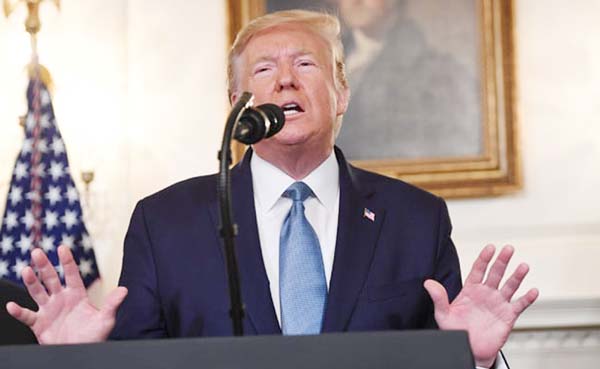
The United States on Monday formally notified the United Nations that it was withdrawing from the Paris climate accord, making the world’s largest economy the sole outlier from the agreement.
President Donald Trump went ahead with the pullout despite mounting evidence of the reality and impact of climate change, with September the fourth month in the row with near- or record-breaking temperatures.
The United States presented its withdrawal letter to the United Nations on the first possible date under the accord negotiated by Trump’s predecessor Barack Obama.
It will be officially out of the Paris accord on November 4, 2020, one day after the US election in which Trump is seeking a second term.
Announcing the move, Secretary of State Mike Pompeo reiterated Trump’s remarks in 2017 that the agreement imposed an “unfair economic burden” on the United States.
“The US approach incorporates the reality of the global energy mix and uses all energy sources and technologies cleanly and efficiently, including fossils fuels, nuclear energy and renewable energy,” Pompeo said in a statement.
The United States is still planning to attend this month’s COP climate negotiations in Spain, according to a State Department official.
Pledging to pursue a “realistic and pragmatic model,” Pompeo pointed to a 13 percent US reduction of greenhouse gas emissions blamed for climate change from 2005 to 2017 even as the economy grew.
But Trump, who took office in 2017, has also pledged to turn back environmental regulations, seeking to block California from setting tighter standards on car emissions and moving to let states set their own standards on existing coal-fired power plants.
A number of states, notably California and New York have taken the lead in fighting climate change in the face of hostility by Trump.
Eye on 2020 race
Robert Menendez, the top Democrat on the Senate Foreign Relations Committee, said that the Trump administration has “once again thumbed its nose at our allies, turned a blind eye to the facts and further politicized the world’s greatest environmental challenge.”
Former vice president turned climate champion Al Gore deplored Trump’s decision-but said that a new president could re-enter the Paris accord within 30 days.
“No one person or party can stop our momentum to solve the climate crisis, but those who try will be remembered for their complacency, complicity and mendacity in attempting to sacrifice the planet for their greed,” Gore said.
The Paris accord set a goal of limiting temperature rises to well within two degrees Celsius (3.6 Fahrenheit) from pre-industrial levels, a goal that scientists say is vital to check the worst damage from global warming such as increasing droughts, rising floods and intensifying storms.
Mindful of the politics at home, Obama insisted that the goals be loosely enforced, with each nation choosing its own actions and informing the United Nations.
A total of 197 countries have signed the Paris accord, from tiny islands fearful for their continued existence to authoritarian North Korea and war-torn Syria.
But contrary to some predictions, Trump’s decision did not trigger a domino effect of withdrawals by countries such as Brazil and Australia.
Brazilian President Jair Bolsonaro, an ideological ally of Trump, has belittled environmentalists but has held off on threats to withdraw from the Paris accord, with the European Union requiring adherence as a condition for a major trade deal.
Trump has campaigned as a champion of the white working-class and cast the climate accord as elitist, saying when announcing his decision that he was “elected to represent the citizens of Pittsburgh, not Paris.”
But a Washington Post poll last month found that even in his own party he faces growing opposition on the issue, with 60 percent of Republicans agreeing with the scientific consensus that human activity is causing climate change.

